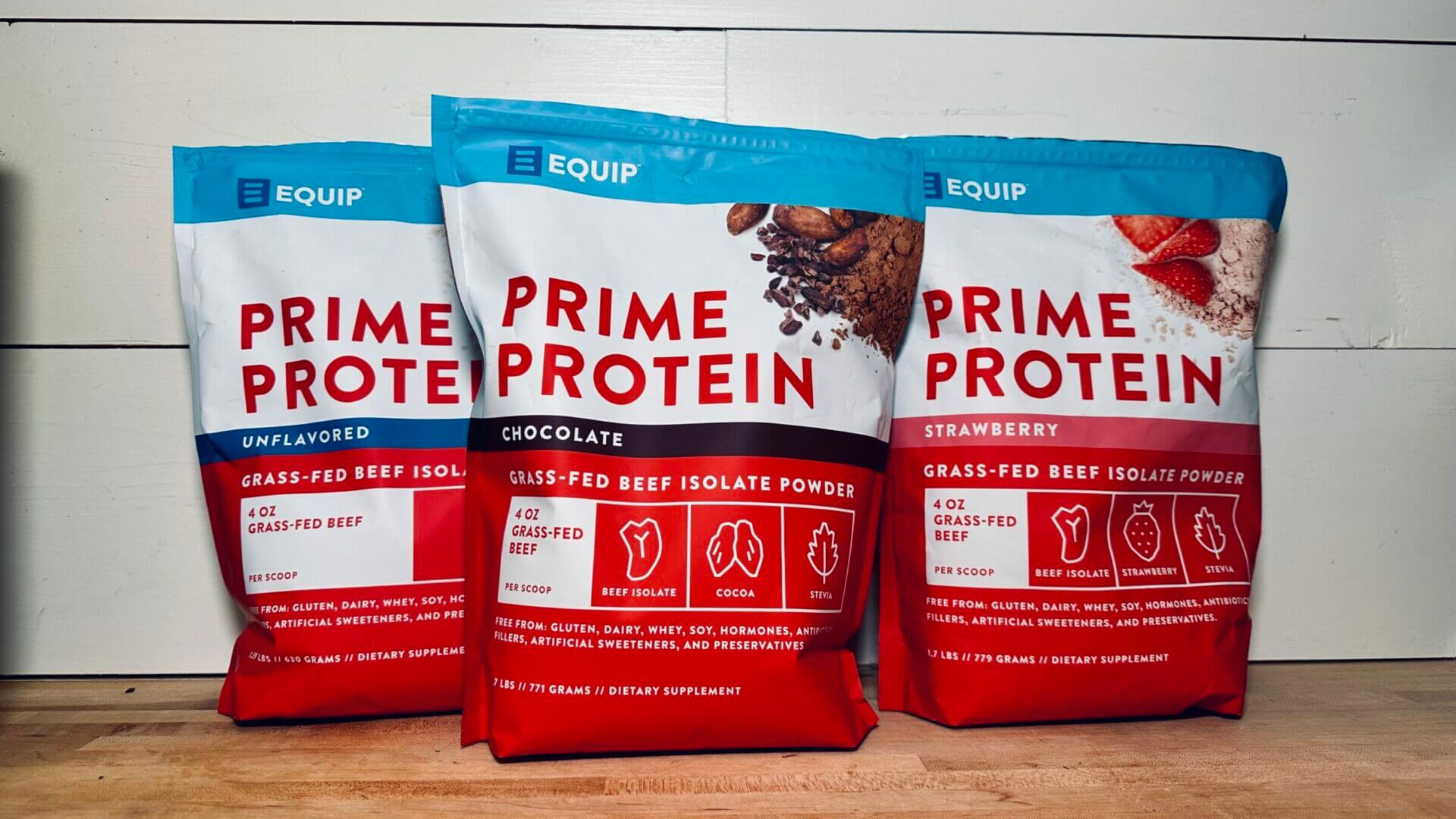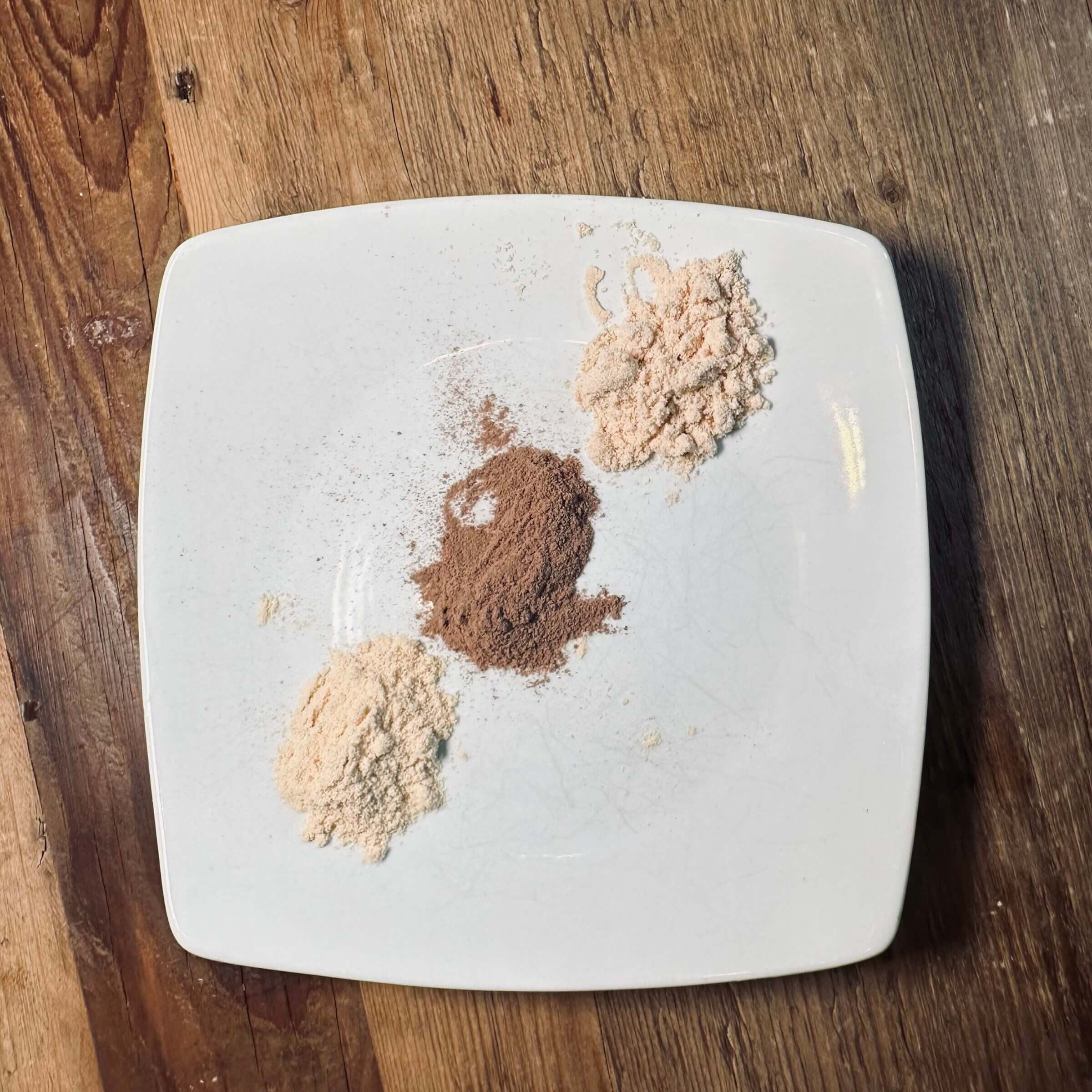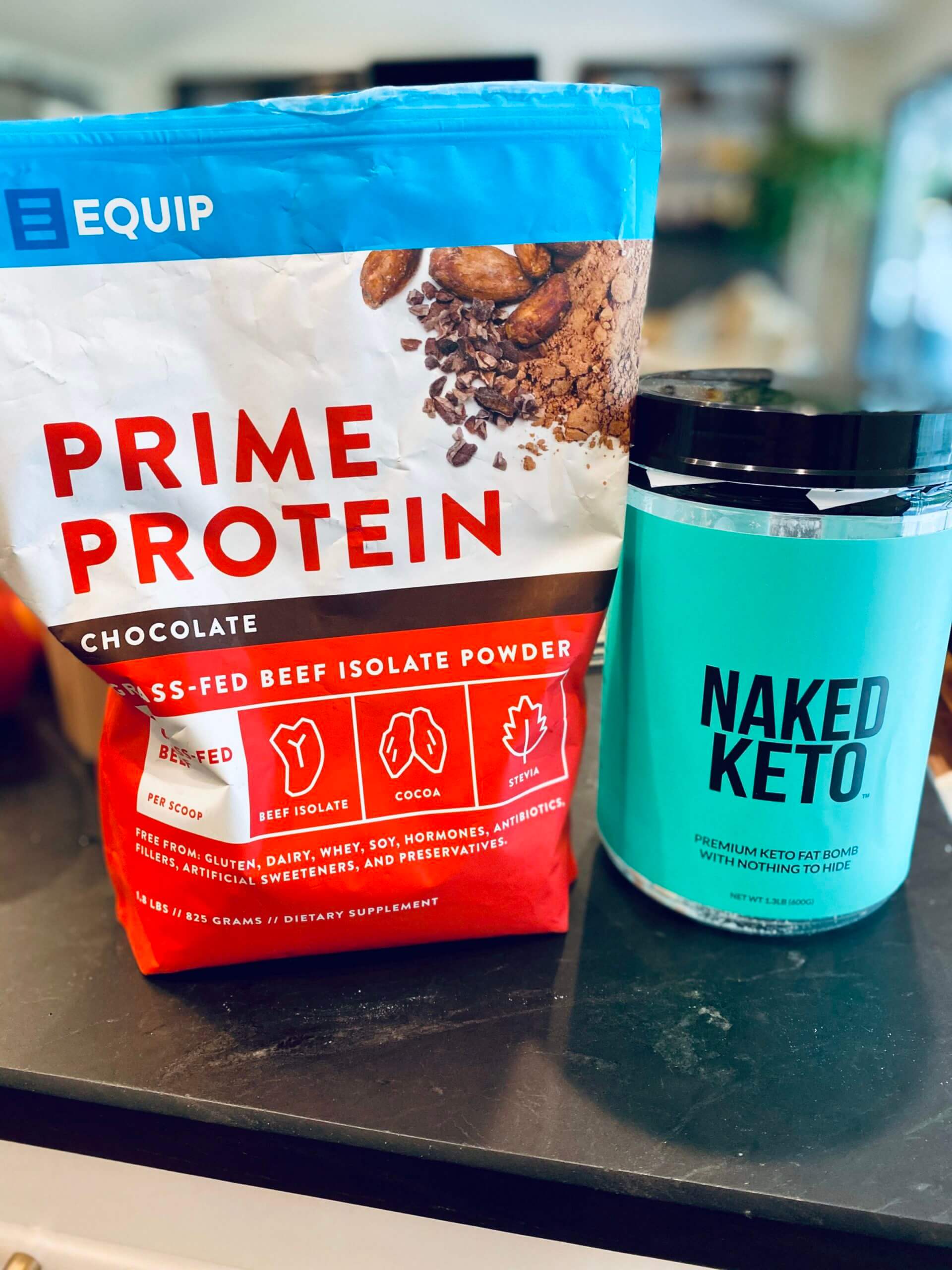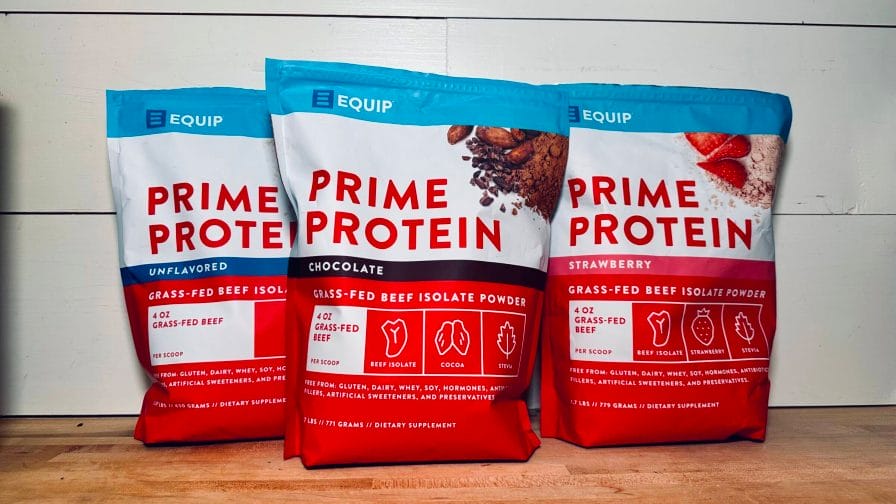Equip’s Prime Protein is the first beef protein isolate I tried after Paleoethics discontinued its well-regarded powder a few years ago. In this review, I’ll tell you about my experience using the product, dig into its ingredients list, and answer the question of when using a beef protein powder makes sense in the first place.
Before we get into that deep dive, there are three key things to know about Prime Protein:
- It mixes into liquids very smoothly, despite the absence of emulsifiers or artificial ingredients.
- Unlike many competing products, it doesn’t contain Sucralose or other artificial sweeteners.
- Its amino acid profile is less robust than that of whey protein.
That last point may be a concern for strength athletes looking to get the absolute maximum benefit out of their protein powder. We’ll talk more about that later in the review, in the section about beef protein powder vs. whey and egg protein.
Equip Prime Protein Review
The core ingredient in Prime Protein is 100% grass-fed beef protein isolates, which are derived from bones, as well as the adhering connective tissue and muscle meat. This is in comparison to the junk beef protein used by many other companies, and it means you get 21 grams of high-quality protein per serving.
When Prime Protein first launched, it came in just two flavors — chocolate and vanilla — and they both had super-clean ingredient profiles.
Prime Protein now comes in six flavors as well as an unflavored version, and while I still consider it a clean product overall, the new additions to the product lineup contain a few ingredients that are worth talking about:
- Acacia fiber: I’m not a huge fan of processed plant fiber because it makes me bloated. However, among all the different types of fiber I’ve tried, Acacia fiber is likely the least problematic.
- Beet juice: While I’m not a huge fan of plant foods overall, a bit of beet juice for color is likely no concern, even if you’re on a carnivore diet.
- Light roast peanut flower powder: Legumes, including peanuts, are one of the plant-based foods I try to avoid like the plague. However, the peanut butter flavor in Prime Protein comes from distilled vapors of macerated high oleic, mold-free peanuts, so you’re not actually eating ground up peanuts.
If you’re a purist and want the cleanest product possible, I’d stick with the unflavored version of Prime Protein. If you’re like me and you’re not concerned about the natural flavors and stevia in the product, you can go with the chocolate (my favorite), vanilla, strawberry (our kids’ favorite), peanut, iced coffee or salted caramel flavors.
How Prime Protein Is Made

Equip doesn’t disclose on its website how Prime Protein is made, so I reached out to the company to inquire. What I learned is that Equip uses BeefISO, a product from Prinova (which is one of the world’s largest distributors of ingredients used by the supplement industry).
Prinova boils down the bones, as well as the adhering connective tissue and muscle meat, to make protein powder. As a result of that process, the final product contains approximately 30% collagen.
Beef Protein Powder Manufacturing Methods

As you might have noticed, there aren’t many beef protein powders on the market. There are a handful, but you won’t find the same variety that you see with whey or some of the other types of natural protein powder I have reviewed.
There are a couple of reasons for that, including a lack of demand and manufacturing challenges. I once had a conversation with the CEO of Ample (the company behind one of my favorite, but now discontinued, meal replacement shakes), who suggested that making clean beef protein powder is incredibly difficult and expensive — much more so than making clean whey protein at a reasonable price.
Making whey protein is relatively easy. In simplified terms, all manufacturers have to do is filter milk to extract the protein molecules. Beef protein is different, because you can get protein from various parts of the animal, including:
- Muscle meat (think steak).
- Organ meat (which is also super dense with micronutrients).
- Connective tissue and skin (collagen).
- Bone marrow (the reason why bone broth is a source of protein).
As you can imagine, making beef protein powder from pasture-raised, grass-fed and grass-finished muscle meat is expensive. In fact, it’s so expensive that most people wouldn’t be willing to pay for it.
So what manufacturers use instead are other (less expensive) parts of the animal to make protein powder, including connective tissue and skin. As a result, most of the beef protein powder on the market is very similar to collagen powder (or gelatin) if you compare their amino acid compositions.
Beef Protein Powder vs. Whey or Egg Protein
If you’re looking for beef protein to build muscle mass, you want a type of protein that has ample amounts of essential amino acids and, in particular, branched-chain amino acids (BCAAs).
Compared to whey or casein, beef protein powder isn’t a great source of BCAAs (especially leucine).

However, if your goal is to supplement a healthy dietary lifestyle that’s geared towards longevity and well-being, and not to look like the next Arnold Schwarzenegger, then beef protein might be a great choice.
That’s because amino acid restriction, and BCAA restriction in particular, has been shown in studies to activate some of our ancient survival circuits. These circuits trigger cell maintenance programs that repair cells and DNA.
In other words, restricting your intake of certain essential amino acids may help you live longer and be healthier.
That’s why I like using collagen peptides and beef protein powder — because they induce a healthy form of stress to my body and, together with intermittent fasting and a low-carb diet, force my cells’ survival circuits to turn on and repurpose amino acids and proteins from damaged cells (instead of getting them from food).
That doesn’t mean I never eat complete sources of protein. I do. But they usually come from fresh food sources like pastured meats (including organ meats like liver pâté) and seafood.
So where does that leave us with beef protein powder?
If longevity is your primary concern and you need an easy way to supplement your protein intake, beef protein powder is an excellent option.
If you’re a weightlifter, bodybuilder or strength athlete, building lean muscle mass likely takes priority over your overall health and well-being. In that case, beef protein in powdered form isn’t a great option because it lacks sufficient amounts of the essential amino acids your muscles need to grow.
In that case, I’d go with whey or egg protein instead. Check out my review of the best natural protein powders for product recommendations.
If, after taking all of this into consideration, you still think beef protein powder is the best option for you, then Equip’s Prime Protein is the product I recommend.
Prime Protein’s Amino Acid Profile
The amino acid profile of Prime Protein (and most other beef protein isolates) is very similar to collagen and gelatin. Below is a comparison table that illustrates what I mean by that.
| Amino Acids | Beef Protein Isolate | Gelatin | Bovine Collagen | Whey Protein Isolate |
|---|---|---|---|---|
| Alanine | 8.8 | 8.9 | 9.5 | 4.0 |
| Arginine | 7.3 | 7.8 | 7.4 | 1.43 |
| Aspartic acid | 6.2 | 6.0 | 5.7 | 8.78 |
| Cysteine | 0.5 | 0.0 | 0.0 | 1.83 |
| Glutamic acid | 11.3 | 10.0 | 9.9 | 13.57 |
| Glycine | 20.1 | 21.4 | 23.0 | 1.43 |
| Histidine | 1.2 | 0.8 | 0.6 | 1.3 |
| Hydroxylysine | ~0.3 | ~1.0 | 1.0 | 0.0 |
| Hydroxyproline | ~3.8 | ~11.4 | 11.4 | 0.0 |
| Isoleucine (BCAA)* | 1.7 | 1.5 | 1.3 | 4.7 |
| Leucine (BCAA)* | 3.9 | 3.3 | 2.9 | 8.09 |
| Lysine* | 5.1 | 3.5 | 3.6 | 6.87 |
| Methionine* | 1.2 | 0.7 | 0.5 | 1.74 |
| Phenylalanine* | 2.3 | 2.4 | 2.0 | 2.3 |
| Proline | 11.1 | 12.4 | 13.2 | 4.26 |
| Serine | 3.4 | 3.6 | 3.1 | 3.52 |
| Threonine* | 2.1 | 2.1 | 2.0 | 5.35 |
| Tryptophan* | 0.3 | 0.0 | 0.0 | 1.43 |
| Tyrosine | 0.9 | 0.5 | 0.2 | 2.35 |
| Valine (BCAA)* | 2.8 | 2.2 | 2.4 | 4.48 |
Looking at the table above, you’ll see that beef protein isolate, gelatin and collagen have a few things in common. Most notably, they all have high amounts of the non-essential amino acid glycine and lower amounts of branched-chain amino acids (leucine, isoleucine and valine), compared to whey protein.
Considering that BCAAs are the key amino acids for muscle growth, beef protein isolate often isn’t the first choice for bodybuilders and strength athletes. However, as I discussed in my article on the best collagen powders, collagen peptides have numerous health benefits in other areas, including tissue growth and repair. That’s one of the reasons why I like beef protein powder and, in particular, Prime Protein.
How to Use Prime Protein

Prime Protein mixes relatively well with both cold and hot liquids, including water and raw milk. But you’ll likely notice some clumping, considering that Equip doesn’t use any flow agents or emulsifiers in its product.
The kids and I enjoy Prime Protein mixed with raw A2 milk we source from a local farm. Adding milk makes the final shake thicker and creamier, which we prefer. But if we run out of milk, we mix Prime Protein with cold or warm water.
My wife uses Prime Protein to make smoothies by combining the powder with other powdered supplements, including a collagen peptide powder.
I recommend using a blender bottle to achieve the best results.
Prime Protein Cost and Discount Code
A pouch of Equip Prime Protein is $63.99. That boils down to a little more than $2 per serving, as each pouch contains 30 servings. While that isn’t cheap, I think it’s reasonably priced for the quality of ingredients you get.
To save some money, you can sign up for a recurring subscription, which brings the price down to $1.81 per serving.
You can also use my promo code MK15 and get an extra 15% off. When combined with a subscription, that lowers the price per serving down to a very reasonable $1.69.
Frequently Asked Questions
No, and I consider that a good thing. I prefer protein powders that contain only protein. Some brands add “extras” to their protein powders, including synthetic vitamins and proprietary anabolic nitrogen retention blends.
The problem is that synthetic vitamins are poorly absorbed by the body, making them relatively useless. If you’re looking for ways to bolster your nutrient intake, consider using freeze-dried beef organ supplements.
Beef organs are among the most nutrient-dense substances on the planet, and the vitamins and minerals they contain are significantly more bioavailable than the synthetic substances found in most multivitamins.
Protein shakes are not complete meals because they lack fat (the other essential macronutrient besides protein) and micronutrients. You can certainly have a shake or smoothie as a snack or to replace an occasional meal, but I wouldn’t make it a habit.
You can read my list of the best keto meal replacement shakes to learn about some of the better options on the market.
According to the Institute for Medicine, the recommended daily intake of protein for adults is about 1 gram per kilogram of body weight, depending on your activity level. Elite athletes might consume as much as 3.5 grams per kilogram of body weight per day.
Unless you’re an elite athlete, my recommendation is to intermittently restrict protein consumption, because some researchers suggest that doing so could improve longevity.
If you consume significantly more protein than your body can use, you might end up with digestive issues, nausea, headaches and other symptoms. Chronic overconsumption of protein can even lead to more serious issues, such as liver and kidney problems.
I haven’t found one yet. As I noted earlier in this article, producing a protein powder solely (or even primarily) from muscle meat would be prohibitively expensive.
Equip Prime Protein Review: Final Verdict
Equip Prime Protein

Summary
Prime Protein is a beef protein isolate that I use to help fill dietary gaps. It’s the best beef protein powder on the market, but it may not be the right choice if your goal is building muscle.
Pros
- Has clean and simple ingredients.
- Derived from 100% grass-fed cattle.
- Paleo-friendly and keto-friendly.
- Sweetened with stevia (no sugar).
- Free of gluten, dairy, soy, hormones, antibiotics, artificial flavors and preservatives.
Cons
- The amino acid profile is less robust than that of whey protein (see the “How Prime Protein Is Made” section for more info on this potential downside).
Despite the fact that I usually only eat one or two meals a day and work out six times a week, I try to satisfy my nutritional requirements with fresh food. But I’m fortunate in the sense that both my wife and I work from home and we get to make every meal from scratch.
Still, my life isn’t perfect and I’m sure my nutrition has gaps. That’s why I selectively use gap fillers like beef protein powder to supplement my relatively healthy lifestyle.
And whenever I purchase a product of that nature, I look for clean options with only a handful of healthy ingredients and without added sugars, artificial sweeteners or colors, or other inflammatory compounds.
Equip Prime Protein perfectly fits that bill (so long as you don’t opt for the peanut butter flavor), and I recommend it to anyone who is looking for the best beef protein isolate on the market.

Michael Kummer is a healthy living enthusiast and CrossFit athlete whose goal is to help people achieve optimal health by bridging the gap between ancestral living and the demands of modern society.



Michael , how is the equip collagen ? And how is the equip colostrum vs armra colostrum ? Does the equip colostrum have igf -1 in it ? Also if I take prime protein daily do I need to purchase the liver pills of organ pills that equip offer ? Thank you sir
Hey Ryan,
I love the Equip Collagen. In fact, I just published a video on the best collagen supplements (see https://youtu.be/wN9UdZyGgiU). Armra is overpriced for what it delivers imho. So I’d also go with Equip’s which has everything Armra has.
On a side note, my wife and I launched a Collagen & Colostrum combo product a while ago. It has only two ingredients without any funky stuff and that’s what we’ve been using at the Kummer house every day (for obvious reasons). You can check it out at https://shop.michaelkummer.com/products/grass-fed-collagen-colostrum.
Beef Liver is a rich source of micronutrients (vitamins and minerals…) while beef protein is just that (a macronutrient). Those are different supplements and can be taken at the same time.
Let me know if that helps!
Cheers,
Michael
We’ve recently put my daughter on this protein powder and it’s a winner! She’s 15, an extremely picky eater, a year long soccer player, and recently started lifting weights with a trainer for strength and to hopefully increase her size. She’s small, 115 pounds on a good day, at almost 5’5” and she plays defense. Although she’s has a small frame, she’s deceptively strong, but weight vs. weight she can sometimes get bulled on the field. We are not familiar with the nutrition world, but we are mostly dairy free and gluten free. We love this product because of that alone, not to mention it doesn’t have all the junk in it and it doesn’t cause bloat. My question to you is, since you said this isn’t great for those wanting to increase size, should we consider something else? We aren’t wanting her to become a big body builder but since we are looking for her to gain a little bit of weight, should we add amino acids or look at something else?
In her chocolate shake we are adding peanut butter and banana too.
Thoughts?
Hey Jennifer,
I think Equip is an excellent choice for your daughter! Bananas in her shake are fine but I’d avoid peanut butter and other (actual) nut butters for all the reasons outlined in https://michaelkummer.com/plants-vs-meat/
I cant tolerate whey so would supplementing with beef protein along with an EAAS supplementing be a good plan.
Hey Frank, if you follow a proper diet and supplement with beef protein, you won’t need any extra aminos imho.
what are your thoughts on FASTer Way beef protein? it’s about the same price if you subscribe and order enough to skip shipping costs. the way they source the protein sounds cleaner but I don’t want to be gullible.
thanks!!
Hey Krystle,
The protein is exactly the same as Equip uses (HydroBEEF) but I’m not a fan of sunflower lecithin and avoid it, if possible. I’d also ask what’s behind their natural flavors.
Cheers,
Michael
Have you heard of DIAAS( Digestible Indispensable Amino Acid Score)? This accounts for amino acid digestibility and absorption at the end of the small intestine- proposed to be a more accurate measure of a protein’s contribution to human aa and nitrogen requirements, as opposed to PDCAAS.
The highest DIAAS belongs to whole milk powder at 1.159 as compared to beef (1.116), hard boiled egg(1.13) and gelatin( 0.02) a large component of beef protein powder. Regrettably collagen was not on the list.
Dairy allergies and intolerance’s notwithstanding, in my humble opinion, organic grass fed dry milk powder is a more affordable option
Hey Viviane,
I’m not opposed to raw dairy, but I consider processed (pasteurized) dairy more like junk food. The high heat used in pasteurization denatures the proteins and destroys most of the bioactive compounds. On top of that, the lactose and casein in processed A1 milk can often cause digestive issues for many people. If you can tolerate it, that’s great! But personally, milk powder wouldn’t work for me.
Awesome article, I was wondering why the amino acid profile did not look like muscle meat.
But why just dont eat the meat instead of this? more cheap and better no? 4oz is a little bit of minced meat, tks
Protein powders are an excellent option for those who struggle to consume enough protein for building muscle tissue (e.g., strength athletes). Most people won’t need protein powders but if you’ve ever tried to consume 1.5-2 grams of protein per body weight you probably know that it can be a struggle.
Oh Mike, i’m right with you on the Equip Beef Protein–clean! there is none other with a profile like this one. Can’t wait to get some I like that you add some Naked Keto for xtra fat–that will certainly hold you even longer. Well, i’m truing to get my thyroid back and great clean protein is essential. Can’t stand those other brands with xanthan gum, acesulfame you name it; we don’t want it or need it. thank you so much!